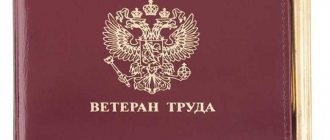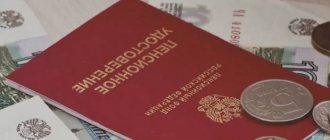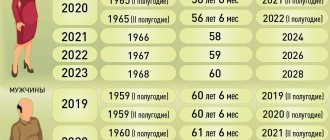Participants of the Second World War from among the citizens of the former USSR and allied countries deserved special treatment. Both in Europe and in the USA they are given significant privileges. In Russia, Soviet people who fought with the soldiers of the Nazi coalition are also entitled to benefits. This is a pension for WWII veterans and a number of other privileges. Read more about this in our article.
Pension of WWII veterans in 2020: amount and types of support
Who is eligible to receive WWII veteran status?
Veterans of the Second World War are considered to be former soldiers, foremen, midshipmen and officers who took part in hostilities with Germany and its allies in the period from 1941 to 1945 for at least 6 months. The same applies to rear workers who were awarded orders and medals for excellent work during the specified period of time.
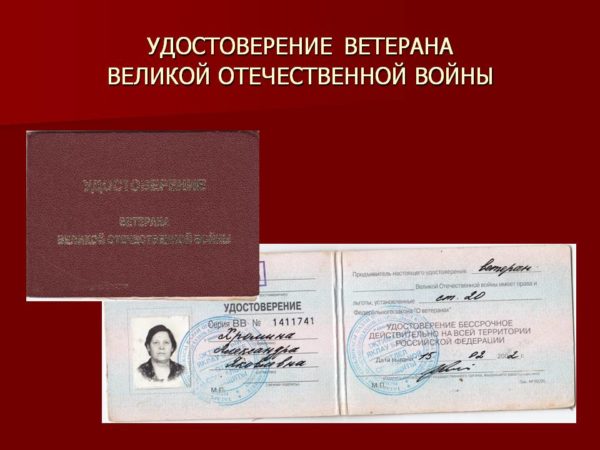
Certificate of a veteran of the Great Patriotic War
In addition to military personnel, the following are considered participants in the Second World War:
- trainees of combat units, cabin boys who served in active units of the Navy;
- partisans, figures of underground organizations in the occupied territories;
- employees of other law enforcement agencies who took part in the defense of the country;
- front-line journalists, photographers, cameramen who filmed newsreels;
- artists who participated in tours to raise morale in the units;
- civilians who survived the siege of Leningrad.
Note: even if the underground and partisan struggle was carried out on the territory of foreign states, its participants also have the right to count on benefits.
Pensions for war veterans in 2020: increase
If a military personnel receives a pension, which is calculated based on length of service, then Law No. 4468-1, Article 17, clearly determines the amount of the additional payment. This size is not the same for everyone, but depends on several reasons:
Law in the Russian Federation
It is worth noting that veterans of war or combat include not only citizens who have reached retirement age. A military (combat) veteran's certificate is issued to military personnel, as well as employees of law enforcement agencies of the Russian Federation who took part in armed conflicts and wars. These include both Chechen campaigns, military operations during the USSR, and the war in Afghanistan. Veterans also include military personnel who cleared mines in the territory of the Soviet Union after the Second World War until the end of January 1957.
- Lawyer, Ufa Chat They say in Moscow they milk chickens, this is from the same series. October 23, 2013, 12:28 pm Was the lawyer's answer helpful? + 1 — 0 Collapse
- Chat Unfortunately, no, this is not correct information. October 23, 2013, 12:29 pm Was the lawyer's answer helpful? + 1 — 0 Collapse
- Lawyer, Mr.
Federal laws on veterans of the Great Patriotic War
The main document concerning the status of categories of benefit veterans is Federal Law N5, adopted back in 1995, but repeatedly supplemented. Last changes were made on January 1, 2020.
- The second article describes all the characteristics of citizens who may qualify for social assistance.
- Articles 13-17 talk about government measures to support beneficiaries, and Art. 20 – affects the rights of home front workers and labor veterans of the USSR during the period 1941-1945.
- In Art. 23:
- paragraph 1 - talks about the amount of monthly payments and calculation rules;
- paragraph 2 – information about assistance in paying for housing and communal services and purchasing housing.
N122-FZ (adopted in 2004) describes benefits for minor prisoners of concentration camps, and Decree of the President of the Russian Federation of March 30, 2005 No. 363 describes the nuances of paying additional monthly support to participants, veterans, and disabled people of the Second World War.
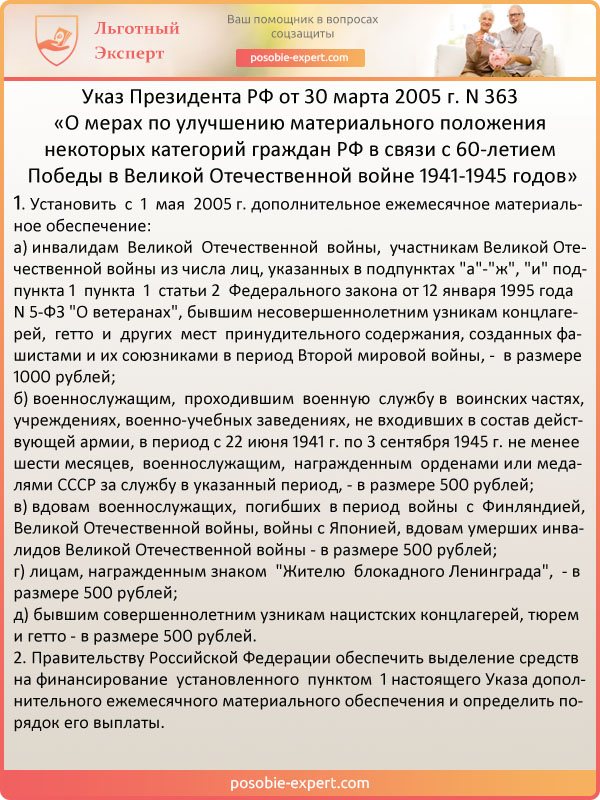
Decree of the President of the Russian Federation of March 30, 2005 N 363
Categories of beneficiaries
There are two categories of citizens who are entitled to receive assistance from the state:
- The direct participants of the Second World War were military personnel and civilians whose activities were related to defense.
- Those injured as a result of the fighting are camp prisoners, disabled people (including those killed) and their relatives.
Information: residents of besieged Leningrad are also considered WWII veterans.
Additional payments to the pensions of WWII veterans
In addition to the above pension payments, all categories of WWII participants are also entitled to certain monthly additional payments to their pensions. As of 2020, the following pension supplements and EDV exist:
DEMO
By virtue of Decree of the President of the Russian Federation No. 363 of March 30, 2005, a number of WWII veterans have been paid additional monthly financial support (DEMO) since April 2005 in the amount of:
- 1000 rub. — these additional payments are received by disabled people and WWII front-line soldiers, as well as juvenile prisoners of fascist concentration camps;
- 500 rub. — this DEMO value is established for holders of the “Resident of Siege Leningrad” badge, adult prisoners of concentration camps and military personnel who did not fight on the fronts of the Second World War, but served for at least six months in the rear units from 06/22/1941 to 05/09/1945.
Monthly cash payment
In addition to additional material support, all categories of WWII veterans (including home front workers who do not receive DEMO) are entitled to EDV. Monthly payments can be either purely monetary or formed from a smaller amount of money and a set of social benefits. services (NSS). The latter consists of: provision of medicines, provision of a voucher to a sanatorium and free travel to it. In 2020, the cost of NSO in monetary terms reached 1,155 rubles. per month.
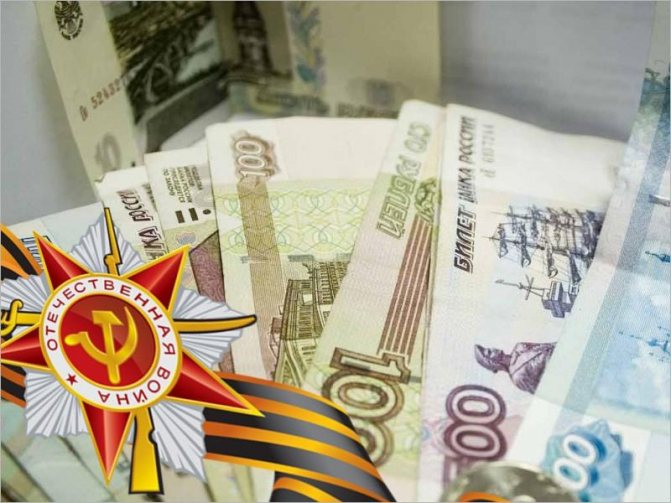
Each WWII pensioner has the right to independently choose what type of EDV he wants to receive. If they refuse the NSU, in 2020 veterans will receive the following “net” EDV:
- 5565 rub. the state pays disabled people of the Second World War (including minor prisoners of concentration camps);
- 4173 rub. — WWII participants and juvenile prisoners without disabilities;
- 3062 rub. - persons with the sign “Resident of besieged Leningrad”;
- 1670 rub. - home front workers, as well as spacecraft soldiers and commanders who served in rear military units during the war.
Regional payments to veterans
By virtue of Art. 20 Federal Law No. 5-FZ dated January 12, 1995, financial support for home front workers is entrusted to the constituent entities of the Russian Federation. Accordingly, additional EDV for persons who worked in the rear during the Second World War for at least six months are established by laws adopted in each region of Russia by local deputies. However, due to the fact that the financial capabilities of different constituent entities of the Russian Federation differ from each other, former home front workers with the status of WWII veterans living in different regions receive different financial support.
However, usually the amounts of this support are set within the average DEMO value (from 500 to 1000 rubles). A typical example is the Ryazan region, where representatives of this category of WWII pensioners receive about 800 rubles. monthly.
In addition to regional bonuses for home front workers, in many regions of Russia the authorities also establish additional payments to other categories of veterans. For example, in Moscow there are additional payments to participants in the defense of Moscow (in 2020, the latter receive 8,000 rubles monthly); in St. Petersburg, local authorities have also introduced additional payments. payments to certain categories of former blockade survivors, etc. To find out exactly what additional payments are due to him according to local laws, a WWII veteran living in a specific subject of the Russian Federation should contact the local social security authorities.
Additional payments for rewards
According to Art. 45 Federal Law No. 4468-I dated February 12, 1993, to all WWII veterans who receive military service and who earned military service during the war of 1941–1945. state orders and medals, a pension supplement of 16% of the minimum SP is due.
On the other hand, regardless of the type of pensions assigned to them, war participants awarded the Order of Glory (any of 3 degrees) or having the title of Hero of the Soviet Union, by virtue of Federal Law No. 21 of March 4, 2002, receive a pension bonus in the amount of 100% of SP.
Monetary assistance to WWII veterans
Assistance to WWII veterans is provided in the form of two components: financial and physical.
Table 1. Types of benefits
| Type of benefits | Description |
| Financial support | Social payments once a month in the form of a pension |
| Compensation for benefits (CBS) at the request of veterans in case of refusal of real assistance (medicines, free travel) | |
| Additional payments are accrued by decision of local or federal authorities | |
| Physical and other assistance | Privileges when purchasing goods and services (extraordinary service) |
| Installation of a telephone line to a personal residence | |
| Exemption from payment of state fees when applying to the courts, tax on gifts (not more than 10 thousand rubles per year) | |
| Regional assistance: servicing incapacitated citizens who participated in the Second World War (nurses, nurses), volunteer work |
To receive all types of benefits, you will have to contact government agencies: the Pension Fund of the Russian Federation or the social protection department. Tax preferences can be issued at your local inspection office.
Important: if a veteran is not able to move independently or wants to entrust the registration to third parties, then it is necessary to issue a power of attorney with a notary visa. There is also a reduced rate for notary services.
Monthly pension: amount
Pension payments consist of insurance benefits, social benefits for disability, and other compensation amounts. Indexation occurs almost every year to reduce the impact of inflation. According to Rosstat, the average pension for a WWII veteran is from 20 to 30 thousand rubles.
NSO and EDV in 2020
WWII veterans, like all pensioners, are entitled to a range of social services:
- free medicines prescribed by doctors, as well as medical products (necessary to facilitate life);
- vouchers to sanatoriums for up to 18 days, if there are appropriate indications from doctors;
- travel to the place of treatment with 100% compensation from the treasury.
Information: to receive medicines and medical supplies, you should contact the medical institutions at your place of residence with a passport, veteran’s ID and certificates from the Pension Fund on the assignment of benefits. Doctors will review the documents, write a prescription and indicate the location of the pharmacy where you can get the required drug.
But you can refuse benefits. The range of social services has its own cost. The total cost of the entire set in 2020 is about 1,122 rubles. If the entire NSU or some part of it is renounced, this amount will be compensated to the veteran in monetary terms. The refusal must be sent in writing to the social security authorities.
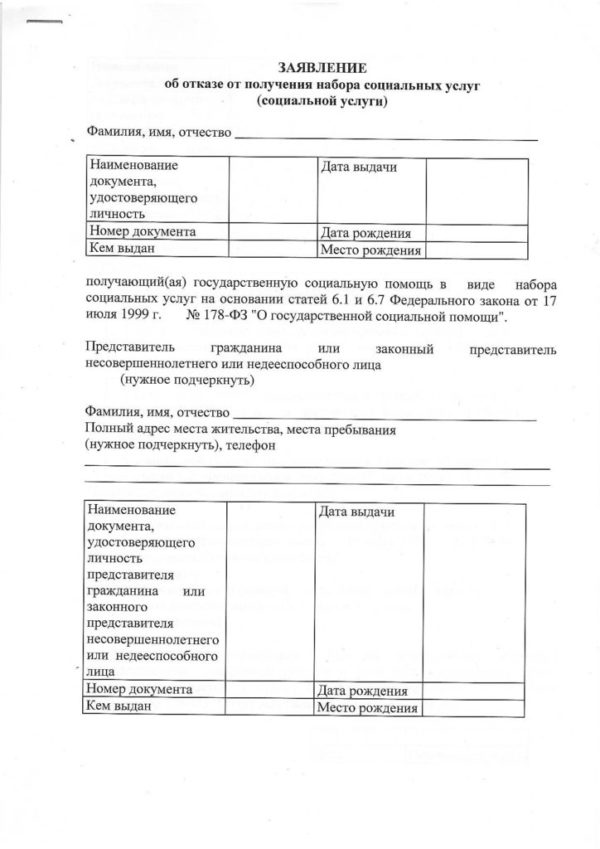
Application for waiver of benefits
In addition, all categories of veterans and persons equivalent to them are entitled to a monthly payment. The size depends on the characteristics of the status of a WWII veteran.
Table 2. Size of EDV in 2020
| Name of beneficiary status | Amount of payment upon refusal of the benefit package (NSU), in rubles | Amount of payment excluding non-taxable income, in rubles |
| Disabled WWII | 5403,22 | 4281,80 |
| WWII participant | 4052,40 | 2930,98 |
| Military personnel 1941-1945 who were not in the active army | 1622 | 500,58 |
| Siege survivors | 2972,82 | 1851,40 |
| Relatives of deceased WWII veterans | 1622 | 500,58 |
| Relatives of deceased persons equated to WWII participants | 4052,40 | 2930,98 |
Important: up-to-date information should be found in the Pension Fund branches at the veteran’s place of registration.
Calculation of benefits and compensations
To accurately calculate the entire pension payment that must be accrued each month, you should use the general formula:
Total pension = age supplement + pension coefficient*point cost
Example No. 1.
Kondratiev Alexey Yurievich - WWII veteran. He is 89 years old. He also has a Group III disability, and his total work experience is 55 years. A pensioner lives in Tula. We substitute the following data into the formula:
- the age allowance is equal to double the monthly payment – 5334.20*2;
- pension coefficient, in our example it corresponds to 72 points (depending on length of service and salary);
- the cost of one point is 87 rubles - for 2020 (in 2020 - 93 rubles).
Thus, the pension amount = 5334.20*2 + 72*87 = 16932.4 rubles.
Additional payments:
- Due to the resulting disability, compensation will be added - 150% of the social pension: 5334.20 * 1.5 = 8001.3 rubles.
- Payment as a disabled person during the Second World War for 2020 – 5403.22 rubles.
- Additional monthly maintenance - 1000 rubles.
Total: 16864 + 8001.3 + 5403.22 + 1000 = 31336.92 rubles.
Note: to accurately determine your pension, you should contact PF consultants.
Help from Germany
Since the 50s of the 20th century, the German government has been implementing special programs, according to which material assistance is provided to those affected by German (and allied) troops. In the period from 2000 to 2007. About 1.8 million Russians who worked against their will in Germany during wartime received compensation payments. Since 2020, negotiations have been ongoing between the ministries of Germany and the Russian Federation on the transfer of funds for payments to residents of besieged Leningrad. Once lists of applicants have been compiled, such assistance will be provided.
Types of pensions for WWII veterans
Almost all participants in the war of 1941–1945. reached retirement age during the existence of the USSR. Accordingly, pensions were also assigned to them in the Soviet Union, and their size did not differ much from pension payments to pensioners without the status of a World War II veteran (the state’s gratitude to the participants of the Second World War under the USSR consisted of providing them with various social benefits).
However, over the last couple of decades, the leadership of the Russian Federation has significantly increased the pensions of the participants in that terrible war - as of 2020, they are 3-4 times higher than the cost of living of an ordinary Russian pensioner.
It should also be taken into account that the majority of WWII veterans (with the exception of those who were assigned a “military” pension, as a former professional military man) have the right to receive not 1, but 2 pensions at once: old-age insurance (SPS) and one of two state security pensions - according to disability or old age.
"Military" pension
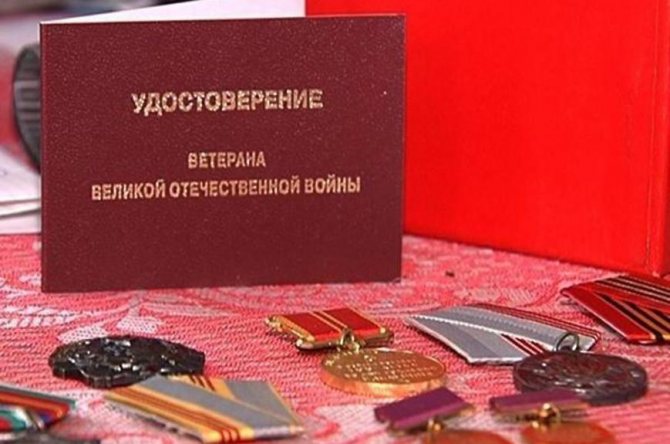
For a long time, pension benefits for WWII veterans were calculated in almost the same way as for other military pensioners - roughly speaking, their summed salaries by military rank and position were simply multiplied by a reduction factor. As a result, until 2019, pension payments to veterans amounted in different years from 54 to 72% of their military salary - even taking into account the fact that, according to Art. 17 Federal Law No. 4468-I dated February 12, 1993, all WWII pensioners over 80 years old receive 32% of the minimum social pension (SP) in addition to their PV, and 64% of the SP are added to military pensioners of the same age with a disability.
However, Federal Law No. 66-FZ, adopted on April 30, 2019, abolished the reduction factor used in calculating the “military” pensions of WWII participants. From May 1, 2020, the amount of the latter is equal to 100% of the military salaries of military veterans - that is, in monetary terms, the pension benefits of WWII pensioners increased by more than a quarter.
According to insurance experience
This pension is received by those participants of the Second World War who, after the end of the war, worked in civilian occupations, and by the time they reached the age of retirement they managed to earn the necessary length of service to receive a labor pension. All conditions for the appointment of SPS are specified in Federal Law No. 400-FZ dated December 28, 2013 - for WWII veterans they are no different from the conditions for the appointment of pension payments to other categories of Russian pensioners.
By disability
Federal Law No. 166-FZ dated December 15, 2001 determines the procedure for establishing an additional state pension for WWII pensioners. In most cases, the 2nd pension for veterans is a disability pension (PI).
In this case, the cause of a person’s disability does not matter - the latter can be either a consequence of an injury or be caused by a common disease. The only exception is the loss of ability to work earned as a result of the veteran committing illegal actions or causing harm to his own health.
According to Art. 16 Federal Law No. 166, the amount of PI for WWII participants and holders of the sign “Resident of besieged Leningrad” depends on the disability group of the pensioner and is calculated from the minimum PI. The specific dimensions of the PI are indicated in the table below:
| Pensioner category | Disability group | PI size, % of SP |
| WWII participants | 1st | 250 |
| 2nd | 200 | |
| 3rd | 150 | |
| Awarded with the badge “Resident of besieged Leningrad” | 1st | 200 |
| 2nd | 150 | |
| 3rd | 100 |
Old age pensions
According to the above-mentioned Federal Law No. 166, those WWII veterans who receive SPS, but are not entitled to receive PI under state support, are assigned a state old-age pension. The size of this veteran’s pension is equal to the value of one old-age pension.
Tax and housing benefits
They are characterized by a reduction in payments for utility services provided, and also provide an opportunity to reduce the severity of the tax burden. This includes:
- 50% discount for paying utility bills: it is important that there should be no debts on previously sent receipts;
- property tax for individuals - until it is completely abolished on one of the objects in the case of owning several identical ones;
- car tax (transport) – up to 0%.
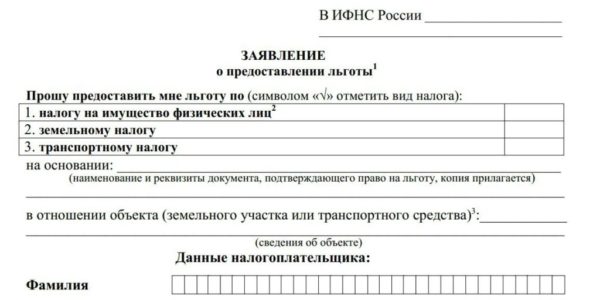
Application to the Federal Tax Service
Documents are prepared at the request of the veteran. He should contact the social security department or the tax office.
Medical benefits
Veterans can count on help in solving pressing problems and additional payments:
- free dental treatment, but if it is necessary to use precious metals and expensive materials, you will have to pay extra;
- provision of personal vehicles and housing, but this applies only to those citizens who applied to the social security authorities before 2005 and were recognized as in need of a vehicle or living space;
- Additional compensation for anniversaries is provided by decree of the President of the Russian Federation.
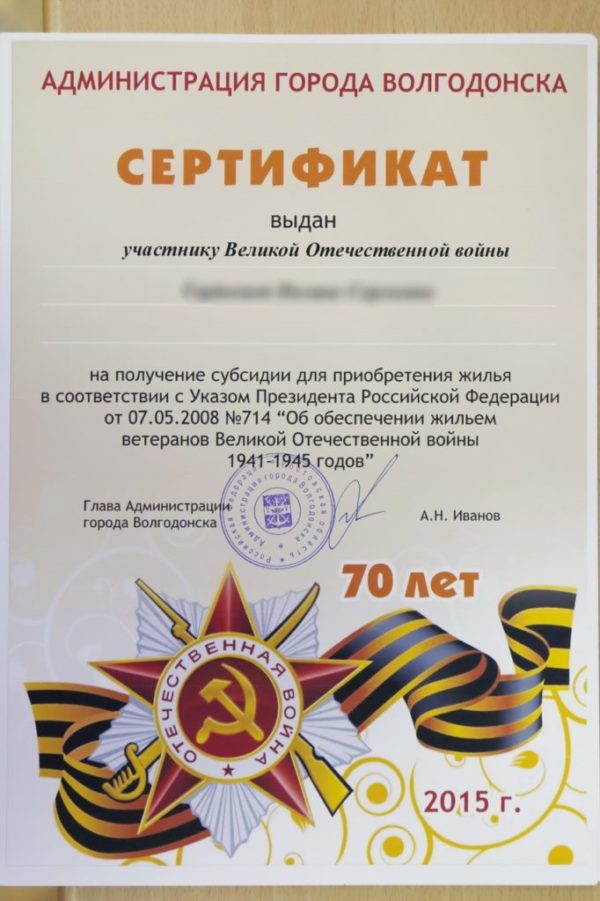
Certificate for improvement of living conditions
The benefit regarding dental prosthetics does not provide the opportunity to install implants or treat concomitant diseases. Inexpensive crowns can be installed. To get this opportunity you should:
- go to the dentist at your local clinic;
- receive a written recommendation on the need to install prostheses;
- contact the social protection department with the specified certificate and ID of the Second World War participant.
Note: officials can consider such an appeal for up to 30 days according to the law.
If a positive decision is made, a corresponding coupon will be issued in the veteran’s name, which must be used within six months. The addresses of clinics where preferential treatment is provided are indicated in the social security department.
Help for family members
Relatives of deceased veterans have the right to count on financial assistance, provided that they were dependent on them. The benefit package includes:
- pension: its size depends on the amount of social benefits of the deceased WWII veteran;
- discount on housing and communal services, half of the total amount;
- free services in medical institutions;
- priority receipt of vouchers to a sanatorium if a veteran who was the breadwinner applied for the corresponding benefit at the place of his last job;
- visiting social service workers;
- assistance from the state, which will be used for funeral services.
When organizing a funeral, municipal authorities will undertake:
- organizational issues to ensure burial;
- transporting the body to a cemetery or crematorium;
- preparation for burial;
- installation of a tombstone.
To receive assistance, you should contact the social security authorities at your place of registration with a passport, the veteran’s death certificate, and his documents that confirm benefits. In some cases, it will be necessary to prove relationship, for example, if the deceased was not a close relative of the dependent. It is possible to apply for compensation after the burial. To do this, you must save all receipts and other documents confirming payment for funeral services.
Minimum package of papers:
- death certificate;
- documents confirming the fact of military service from 1941 to 1945;
- other certificates upon request of officials.
Documents should be submitted to the military commissariat at the place of registration of the deceased. But the application period is no later than six months from the moment of death of the WWII participant.
Information: the amount of financial assistance for organizing a funeral in Russia in 2020 cannot be less than 5,946.48 rubles.
Example No. 1.
A WWII veteran died in St. Petersburg. In 2020, his relatives turned to the municipal authorities for help on the basis that their income was 2 times less than the subsistence level. Local legislation (Law No. 101-22 of 2007) provides for a one-time payment of approximately 9,500 rubles. The amount is issued only for the burial of a combat participant.
Amount of pensions for disabled veterans and war veterans in 2020
In addition, veterans and rear service personnel are included in the list of preferential categories who are entitled to free sanatorium and resort treatment. And in St. Petersburg, war veterans and disabled people are provided with free travel on public transport on the memorable days of the beginning and breaking of the siege of Leningrad (September 8, January 26-28), as well as in honor of Victory Day (May 7-9).
Benefits for veterans at the local level
Another important event: in 2020, with the active participation of State Duma Chairman Vyacheslav Volodin and Vice-Speaker of the House Irina Yarovaya, a law was developed and adopted aimed at combating attempts to insult historical memory.
We recommend reading: How maternity benefits are calculated in 2020 if you have worked since 2020
As for the amount of the surcharge, in 2020 the amount was fixed at 1,200 rubles . It is added to the pension of an elderly person if care is provided for him. The law does not provide for any increase in this type of allowance. In 2020, the amount remains unchanged; an increase in pension after 80 is assigned in the same amount.
To receive a double pension, the applicant does not need to write an application to the pension department. Reaching 80 years of age by pensioners is sufficient grounds for recalculation. An automatic additional payment will be made taking into account the requirements specified in Law No. 173.
We remind you! You can have your situation assessed by a lawyer - it's free! Call!
Benefits in the form of an increase in pension are provided to 90-year-old pensioners. This foundation begins for them at the age of 80. And the benefit can be provided at 85, 90 years and any other age, after the designated minimum threshold. To do this, it is enough to arrange care for an elderly citizen.
Dear readers ! If you need specialist advice on pensions and state benefits, we recommend that you immediately contact qualified practicing lawyers on social issues:
According to Russian legislation, participants of the Great Patriotic War and “blockade survivors” are entitled to old-age insurance pensions, as well as disability benefits under the state pension system. In addition, these categories of citizens have the right to count on receiving all kinds of additional payments established in a particular region.
One-time and monthly payments
Important: If insurance premiums were paid for a citizen, but subsequently he became disabled for reasons beyond his control, he may be assigned a disability retirement pension. In this case, neither age nor the amount of contributions paid will be taken into account.
Attention! If you have any questions, you can consult with a lawyer on social issues for free by phone: +7 in Moscow, St. Petersburg, +7 throughout Russia. Calls are accepted 24 hours a day. Call and solve your problem right now. It's fast and convenient!
It is already known that the Russian government will allocate 950 million this year to increase their pensions. And from next year – up to 1.42 billion more. How will these funds be distributed? Let us recall that in relation to veterans - military pensioners in Russia there is a financial system that provides for three types of increase in pension payments: by increasing their bonuses, increasing the monthly accruals themselves and combining old-age payments with a disability pension.
Some statistics
- military personnel included in active military units;
- members of underground associations and partisans operating in occupied areas or in the territories of other countries;
- trainees of military units;
- employees of departments of internal affairs and state security, if they operated in cities whose defense is included in their length of service;
- civilian troops;
- intelligence officers operating in military units or on the territory of other countries;
- employees of military facilities, cultural units and other organizations who worked in the rear of the front;
- persons who participated in the defense of Leningrad and became disabled as children as a result of WWII operations.
Problems during registration: questions and answers
If you have any questions about calculating your pension, a WWII veteran should contact your local military registration and enlistment office. This will allow you to make a request to receive supporting documents that the applicant actually participated in the battles. The data will be obtained from the archives of the Russian Ministry of Defense. If a citizen has state awards, then the appropriate papers - award sheets - should be prepared. Copies of them are also available in the Ministry of Defense databases. In cases where a citizen believes that his rights were violated when determining his status, he has the right to go to court.
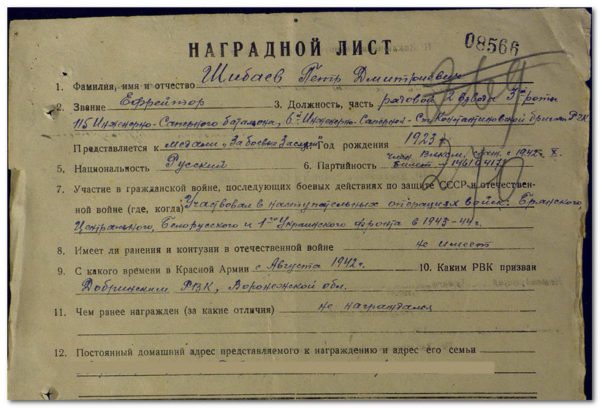
Award list
Question No. 1. My grandfather is a WWII veteran, disabled and in need of constant help. Can one of his relatives apply for sick leave (or benefits) to care for him or apply for help from a caregiver?
Answer: A benefit for caring for an adult relative who is a veteran can be issued under special circumstances. If a relative does not work anywhere officially, then you can send an application to the Pension Fund; the grandfather also needs to fill out an application. Forms are available in the branches.
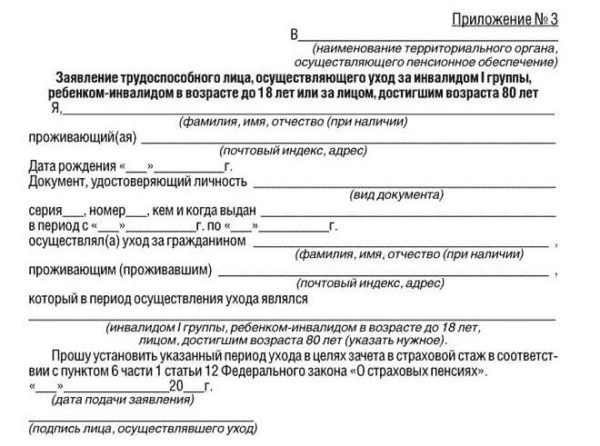
Application form for benefits
You need to understand that the grandfather must be at least 80 years old. The amount of compensation for care is from 1200 rubles, it can be increased taking into account the corresponding coefficient if you live in regions equated to the Far North.
If you work, then caring for an adult relative can be carried out in agreement with the employer (family leave). But no financial compensation will be paid. If necessary, you can take out sick leave to care for an elderly relative. If there is an appropriate medical document confirming the need for care, any working close relative can go to the ballot on this matter. But the employer will only pay for 30 days of such sick leave per year. Therefore, relatives can take such a ballot one by one.
Regarding the nurse: in cities you should contact social services that are able to provide all possible assistance, but practice shows that the services of a free nurse are provided for several (4-5) hours a day. If longer-term support is required, it is better to contact commercial organizations.
Question No. 2. My father fought during the Second World War. Received a certificate for compensation for improving living conditions. We added our own savings and made a deal - we purchased an apartment. But the father died unexpectedly. The Ministry of Defense has not yet transferred the funds to the seller’s account, and, accordingly, they did not have time to register the housing in the State Register. Will the deal be cancelled?
Answer: There are no grounds to cancel the transaction. Once the agreement is signed by both parties, it must be executed in accordance with the law. The RF Ministry of Defense is obliged to transfer the required funds, and you will register the apartment in your name or divide it among all applicants in shares after inheriting.
Which military personnel are entitled to a disability pension?
According to the legislation of the Russian Federation, a disability pension is provided to any military personnel who were wounded, concussed, mutilated or seriously ill while serving in the armed forces of the USSR or Russia. Both individuals who entered into a contract and those who served in military service are taken into account.
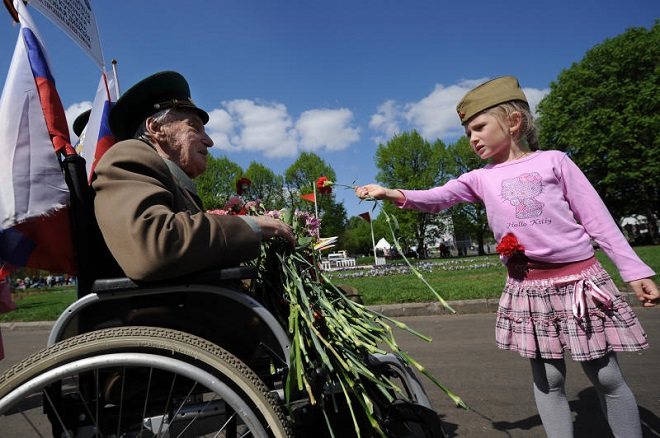
Status of war invalids in 2020
The meaning of the term is much narrower. Disabled people of war are individuals who were injured, injured, shell-shocked or ill during:
- Serving or being in military units of the active army, in military institutions and headquarters, directly at the front, as well as during membership in underground organizations and partisan detachments located in enemy-occupied territory during the Great Patriotic War.
- Execution of official duty in areas of military operations, while being in the ranks of the police, other law enforcement and state security services, as well as fire fighting services.
- Participation in the work of militia units and units to combat deserters, saboteurs, bandits, paratroopers, spies and other formations on a voluntary basis.
- Measures for demining areas of the territory of the Soviet state and allied ones from the beginning of the war until the end of 1951 (both as part of units of state security agencies, and as part of formations created on a volunteer basis by various defense organizations and local authorities). In the case of trawling operations - until the end of 1957.
- Activities for the collection of ammunition and military equipment as part of organizations on a volunteer basis, sanctioned by local authorities, carried out from the beginning of the war until the end of 1951.
- When servicing units of the Red and Russian armies that participated in battles in other countries.
Thus, not only participants in combat events of the Great Patriotic War, but also any others in which the USSR Armed Forces and the Russian Armed Forces have ever participated are considered disabled combatants. Including disabled people from the time of Afghanistan, as well as war disabled people after, respectively, the wars in Chechnya, Transnistria and Kosovo.
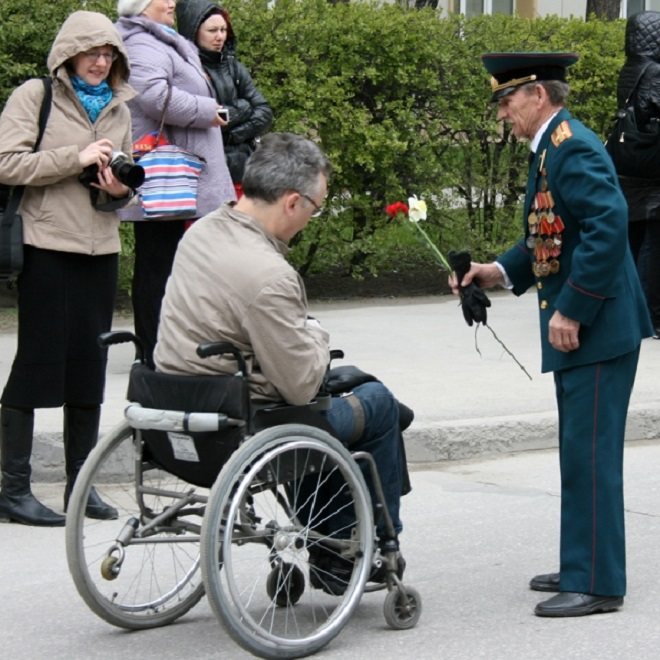
Amounts of military pensions and periods of disability
Disability pension payments to combatants do not differ from payments to people who received disabilities in peacetime. The list of other benefits differs.
This type of pension is paid only if the period of occurrence of a military injury or acquisition of illness coincides with the period of military service or if disability is established no later than three months from the end of service, both fixed-term and contract. Disability is fixed for a certain period or indefinitely if there is no hope of recovery.
People who become disabled due to war injury receive compensation in the amount of:
- 300% of the insurance pension for disability group I;
- 250% of the insurance pension for disability group II;
- 175% of the insurance pension for disability group III.
For example, benefits for a 2nd degree disabled person with a military injury and an insurance pension of 5,180 rubles will amount to 12,950 rubles.
Sickness pension is calculated differently:
- 250% of the insurance pension for group I disability;
- 200% of the insurance pension for disability group II;
- 150% of the insurance pension for disability group III.
Pensions for disabled veterans of the Second World War should increase in the coming years. Thus, the increase in pensions for disabled people of the Great Patriotic War in 2020 should be 2%.
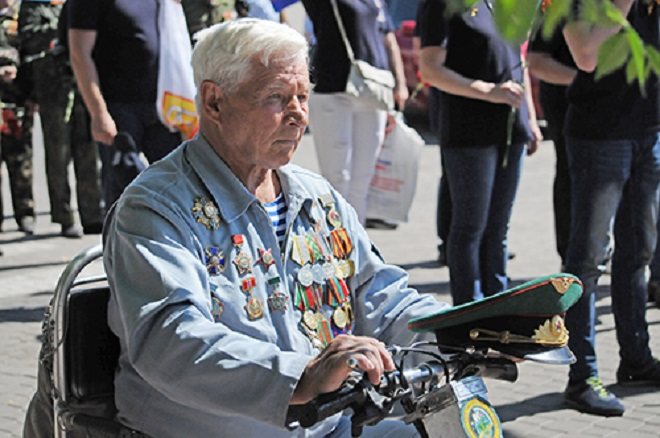
Providing housing for war invalids
Disabled combatants of the Great Patriotic War can take advantage of the right to obtain a place of residence with more suitable living conditions. Persons who registered as military invalids before the beginning of 2005 receive new housing in accordance with Article 23.2 of the Federal Law “On Veterans,” and those who registered later receive new housing in accordance with the housing legislation of the Russian Federation.
Social benefits
Disabled combat veterans are entitled to numerous social benefits. Among them:
- Connect your home phone without waiting in line.
- The right to preferential access to garage, housing, gardening and other cooperatives.
- The right to receive vocational training at the expense of the employer.
- The right to take advantage of extraordinary annual leave of up to 60 days without pay.
- The right to use the services of cultural, sports institutions, communication institutions, retail trade and consumer services, as well as to purchase transport tickets without queuing.
- Admission to social service organizations without a queue (except for those providing services in a non-stationary form).
Benefits for housing and communal services
The state compensates war invalids for 50% of the costs of housing and other utilities, including the costs of major repairs and the purchase of fuel. Expenses for CG are calculated either according to accepted average consumption standards, or according to the corresponding meters, but not more than the average values according to accepted standards.
Medical care for war invalids
Disabled people also receive benefits and guarantees regarding medical services. Namely:
- They retain the opportunity to visit the medical institutions in which they were registered before retirement, and they are also guaranteed free medical care provided without waiting in line.
- Persons with disabilities can receive free prosthetics (except dental ones) and prosthetic and orthopedic products. If the veteran has already purchased this product at his own expense, he is guaranteed compensation.
- Special hospitals for disabled people cannot be abolished or liquidated without the sanction of the Russian Government.


